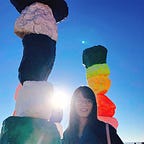Creative writing with a not so creative mind
This has been bothering me for years. About my identity. About my study.
I am from Taiwan, and I study/do performance.
I have been thinking about the intersections between performance studies and Taiwan studies in hope that my identity crisis can someday/somehow be resolved. Questions be answered.
What is performance studies? It has always been an extremely difficult question to answer, just like the question asking what Taiwan studies is. In Diana Taylor’s book Performance, she quoted Guillermo Gómez-Peña: “[P]performance art is a conceptual ‘territory’ with fluctuating weather and borders; a place where contradiction, ambiguity, and paradox are not only tolerated but also encouraged. The borders of our ‘performance country’ are open to nomads, migrants, hybrids, and outcasts” (qtd. in Taylor 3).
That is just like Taiwan in my mind. A conceptual territory (our land, our body, our name) with fluctuating borders, contradiction and ambiguity. We are all looking for ways to define, to express and to position ourselves. We’ve been in a borderland, in a liminal space where nothing is stable. Everything is fluid. Our identities are portable, adaptable. We are searching for an identity (or identities) that can best represent ourselves, and meanwhile challenging all tags and labels that are forced on us.
Taylor commented on Gómez-Peña’s performance: it is “not simply an act, or an action, but an existential condition. An ontology.”
For me, Taiwan is pretty much the same, so is studying Taiwan. Taiwan is an existential condition, a living reality that has always been contested by various forces and that requires actions.
Elin Diamond also argues in Performance and Cultural Politics that performance is about doing and something (to be) done (5). The doing/done lens reminds me of different temporalities of Taiwan — its past, present and future. What we did. What we’ve done. What we can do. What we are doing.
The doing is now, a living practice. It is embodied, somatic, kinesthetic, and of course, telluric. If, like Taylor said, “breaking norms is the norm of performance,” then Taiwan has never been conforming to the norm, for there’s no such thing as the norm for the people on this island.
That being said, the nature of Taiwanese consciousness and Taiwanese identity is inherently performative. We always have spectators waiting to see our performance. They sometimes give us applause for our performance, and sometimes boo us. They let us present our body, but also consume our body.
But it’s fine. It’s the best we can do. And at least we are able to do something.
Some keywords that I’ve learned from performance studies (in whatever order): embodiment, representation, visibility, accessibility, legibility, orientation, politics of naming, politics of looking… all these, can be used to study Taiwan.
How does Taiwan embody our identity/nation/history/memory/past/present/future? How do we represent ourselves (and how are we represented)? How to make Taiwan more visible? How to challenge the invisibility? How to make the knowledge/information more accessible? How to make them legible? (And why they are illegible?) How do we orient ourselves toward or against international society? How do others name us? How do we name ourselves?
I just have way too many questions. Maybe I should stop asking. And right, my advisor said that my research should not be a how-to book, so I should probably stop asking how but think about why and what… anyways
The core of performance studies is not to ask what it is or what it means, but what it can do. I guess that’s the same for Taiwan. It’s not about what Taiwan is or what Taiwan means, but what Taiwan can do. So, we see that Taiwan can help and Taiwan is helping in this pandemic.
It is never easy, and it will never be easy. To be seen. To be understood. To be recognized.
Knowledge is always generated and embodied through performance, and that’s why we rehearse, we practice, we dance, we perform. Taiwan performs.
